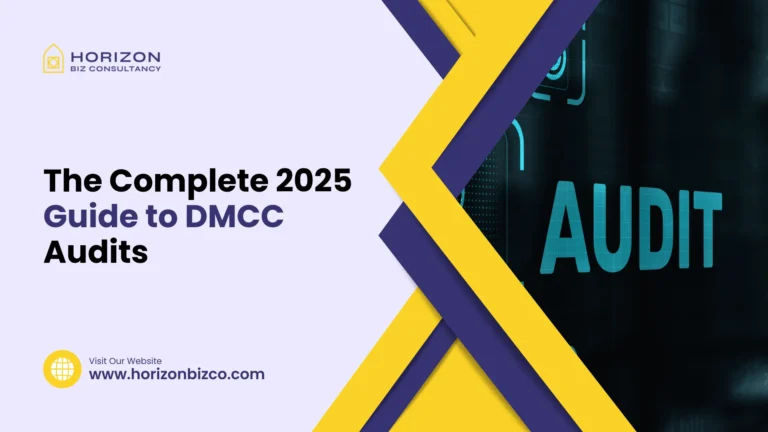Running a company in Dubai’s premier free zone, the Dubai Multi Commodities Centre (DMCC), comes with many advantages … but also some serious responsibilities. Chief among them?
The annual audit of your financial statements. And with the introduction of UAE Corporate Tax, this isn’t just a routine checkbox anymore … it’s a crucial step for staying compliant and avoiding costly mistakes.
In this guide, we’ll break down everything you need to know about DMCC audits in 2025:
- Who must conduct them
- Why they’ve become more important than ever
- Key deadlines you can’t miss
- The penalties you absolutely want to avoid
- How to prepare (without losing your mind)
Who Needs a DMCC Audit?
Short answer? Everyone. Whether your company made millions, had zero sales, or didn’t even operate last year …if you hold a DMCC license, you must submit an annual audit.
There are no exceptions. This rule applies to:
- Companies with no revenue
- Dormant or inactive companies
- Branches and representative offices
Bottom line: If your company is in DMCC, you must do an audit. No exceptions. No arguments. It’s mandatory.
Why DMCC Audits Matter More Than Ever in 2025
DMCC auditors thoroughly examine various financial records like:
- Accounting books: Check if entries in journals and ledgers are accurate
- Bank statements: Verify if company statements match system entries
- Invoices & contracts: Validate if documented terms and amounts align with system values
- Inventory registers: Check calculations around stock items
Ensuring these documents are complete and well-organized is vital for a smooth audit. Auditors also physically inspect your office space and operations.
Why DMCC Audits Matter More Than Ever in 2025
The DMCC audit isn’t just a formality anymore. It’s become the backbone of your Corporate Tax filing. Here’s why it’s a big deal:
- Corporate Tax Readiness: Your audited financials directly feed into your UAE Corporate Tax calculation. If your audit is wrong, your tax return will be wrong. That’s not a risk you want.
- Regulatory Compliance: DMCC uses audits to make sure companies are playing by the rules.
- Financial Credibility: Banks, investors, and business partners trust audited numbers .. not your internal spreadsheets.
- Proof of Integrity: An audit shows you’re not cutting corners. It’s a green flag for future growth.
The Audit-Tax Connection: Deadlines That Matter
Miss these, and you’re in trouble.
- DMCC Audit Submission: Within 6 months of your financial year-end.
- Corporate Tax Filing: Within 9 months of your financial year-end.
Example Timeline (for companies closing books on Dec 31, 2024):
- DMCC Audit Due: September 30, 2025
- Corporate Tax Return Due: September 30, 2025
Key Tip: You can’t file your Corporate Tax return without your audited figures. Finish your audit early — don’t wait till the last minute.
What Auditors Actually Check
Your auditor will dig deep — it’s not just a surface check. They’ll inspect:
- Financial Statements: Balance Sheet, Profit & Loss, Cash Flow
- Accounting Records: Ledgers, journal entries, reconciliations
- Bank Statements: Matched against your books
- Invoices & Contracts: Are transactions properly recorded?
- Tax Records: VAT filings, Corporate Tax calculations, transfer pricing documents
- DMCC Compliance: Are you operating within the scope of your trade license?
Types of Required Audits for DMCC Companies
Every DMCC business needs three kinds of audits each year:
Statutory Audit
- Verifies your financials follow international accounting standards like IFRS.
- Ensures your statements reflect the true financial position of your company.
VAT Audit
- Confirms your VAT is correctly calculated and reported.
- Checks VAT on sales, eligible input VAT, payments, and filing accuracy.
Regulatory Audit
- Confirms DMCC compliance across all business areas.
- Reviews licensing, submissions, company structure, and operational guidelines.
Can You Hire Any Auditor? Nope.
DMCC doesn’t allow you to work with just anyone. You must hire a DMCC-approved auditor.
Using a non-approved firm? Your audit will be rejected. You’ll waste time, risk penalties, and could face serious delays.
You can find the approved auditor list on the DMCC portal.
What Happens If You Miss the Deadline?
Missing your audit deadlines can lead to serious disruptions. DMCC may suspend your trade license, which would pause your ability to operate until everything is properly submitted.
Avoid last-minute stress …. get your audit done on time to keep your business moving.
Quick Tips to Ace Your DMCC Audit
- Stay Organized: Don’t wait till year-end. Keep your accounts up to date every month.
- Sort Your Paperwork: Neatly store contracts, bank statements, invoices — digital or physical.
- Prepare for Tax Queries: Have clear answers for related party transactions and major expenses.
- Book Early: DMCC-approved auditors get busy. Schedule yours well in advance.
Final Thoughts
In 2025, your DMCC audit isn’t just a routine task …it’s a strategic move to ensure your business stays compliant, financially transparent, and tax-ready. By staying organized, meeting deadlines, and working with the right professionals, you can confidently navigate the audit and Corporate Tax landscape.
If you’re seeking detailed corporate tax guidance or need step-by-step audit-related support, Horizon Biz Consultancy has you covered.
Connect through just one click and attend the latest webinar shaping the finance industry today.
FAQ’s
Yes. Every DMCC-registered company must submit an audit — even if it’s dormant.
DMCC Audit: Due within 6 months of your financial year-end.
Corporate Tax Return: Due within 9 months. You can’t file your return without your audit.
Upload your signed audit report to the DMCC member portal.
No. Only DMCC-approved auditors are allowed. Non-approved audits will be rejected.
Yes. Audit requirements apply regardless of profits or losses.





